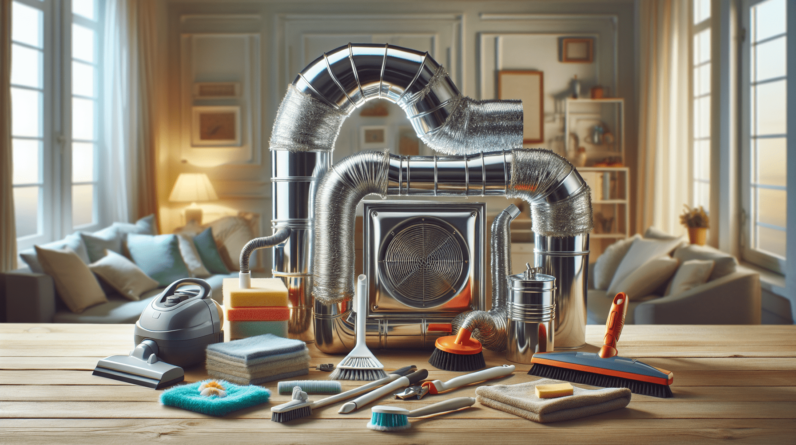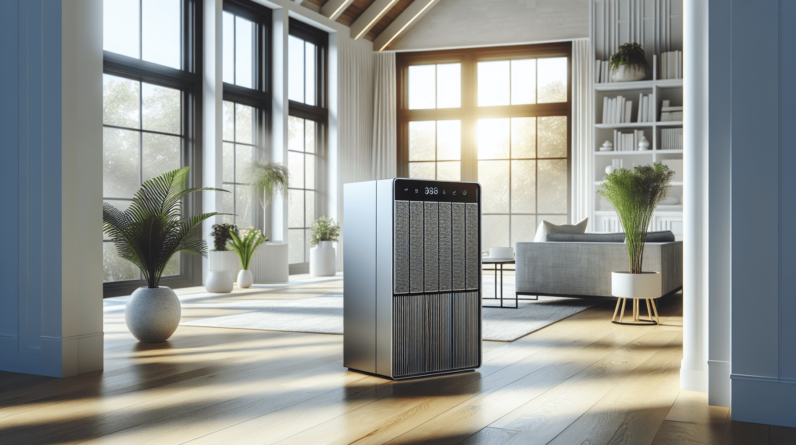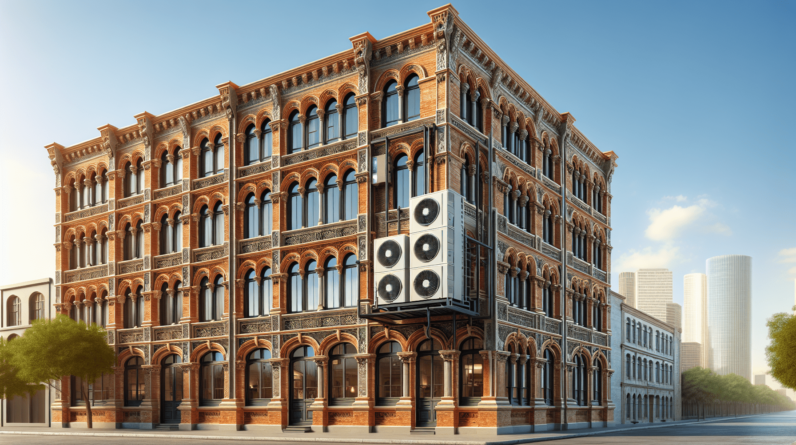
Have you ever wondered how the type of air conditioner you choose can affect your comfort, energy consumption, and even the environment? Understanding air conditioners, particularly DC (Direct Current) ones, can help you make an informed decision that can significantly enhance your living conditions.

What is a DC Air Conditioner?
At its core, a DC air conditioner uses Direct Current electricity to power the compressor and fan. This differs from traditional air conditioners that typically rely on Alternating Current (AC). You might be curious about the benefits and differences between these two types.
The Basics of Direct Current
Direct Current is a type of electrical current that flows unidirectionally, which means it only moves in one direction. This characteristic makes DC electricity more efficient in certain applications, particularly with electronics and appliances like air conditioners.
Why Choose a DC Air Conditioner?
You may be asking yourself why a DC air conditioner would be a good fit for you. The reasons are numerous and compelling.
Energy Efficiency
One of the most significant advantages of DC air conditioners is their energy efficiency. They use inverter technology, which allows the compressor to operate at variable speeds instead of just turning on and off. This results in less energy consumption while still maintaining your desired temperature.
Environmentally Friendly
Because they consume less energy, DC air conditioners also have a smaller carbon footprint. If you’re looking to make environmentally conscious decisions, opting for a DC model is a step in the right direction.
Quieter Operation
You might appreciate the peace and quiet a DC air conditioner can offer. These units operate more quietly compared to conventional AC units because they don’t constantly turn on and off; they adjust their speed based on cooling needs.
The Components of a DC Air Conditioner
Understanding the components of a DC air conditioner can help you grasp how it works and what makes it different from traditional units.
Compressor
The compressor is often considered the heart of an air conditioning system. In a DC air conditioner, the compressor uses a variable-speed motor powered by DC electricity. This allows it to adjust its output based on cooling demand, which contributes to energy savings.
Inverter Technology
Inverter technology is crucial to the operation of DC air conditioners. Unlike traditional models, which operate in an on/off cycle, inverter units can modulate the speed of the compressor. This flexibility allows for more precise temperature control.
Fans and Coils
DC air conditioners contain both evaporator and condenser coils. These coils work in tandem with fans to circulate air throughout your space. In a DC model, the fans are also generally more efficient and quieter than those in standard air conditioning systems.
How Do DC Air Conditioners Work?
You might be interested in the mechanics behind how DC air conditioners function. The process involves a few key steps that are relatively straightforward.
Cooling Cycle
The cooling cycle starts when warm air from your room is sucked into the air conditioner. The evaporator coil cools this warm air via the refrigerant. The cooled air is then circulated back into the room while the cycle continues.
Variable Speed Operation
As mentioned earlier, the inverter technology allows the compressor to operate at variable speeds. This means it can run at a lower speed when conditions are mild, consuming less power, and ramp up when temperatures rise. This adaptability ensures you’re comfortable no matter the weather.
Thermostat Controls
In a DC air conditioner, the thermostat plays a vital role. It monitors the temperature and relays information to the inverter to adjust the compressor’s speed based on your cooling needs. This leads to a tailor-made temperature for your comfort.
Advantages of DC Air Conditioners
There are numerous advantages to choosing a DC air conditioner. Let’s break down some of the significant benefits.
Cost-Effectiveness
Although the initial investment in a DC air conditioner may be higher than traditional units, the long-term savings can be significant. You’ll notice lower electricity bills, especially during the hotter months when cooling is constantly needed.
Increased Comfort
Thanks to their ability to maintain more consistent temperatures, DC air conditioners provide an enhanced comfort level. You won’t have to deal with temperature swings that often occur with traditional air conditioning systems.
Longevity
DC air conditioners generally have a longer lifespan compared to their AC counterparts. The variable speed operation reduces wear and tear on the compressor, making it a more durable option.
Low Voltage Operation
Many DC air conditioners can operate on low voltage. This feature can be particularly useful in areas prone to power fluctuations, as it prevents damage due to electrical surges.

Disadvantages of DC Air Conditioners
While there are many benefits to a DC air conditioner, it’s essential to consider potential downsides as well.
Higher Initial Cost
One of the primary disadvantages is the upfront cost. Because of the technology involved, DC air conditioners can be more expensive initially. However, as previously mentioned, energy savings could make up for these costs over time.
Complexity in Repair
DC air conditioners tend to have more complex components, which can make repairs more challenging and potentially more expensive if something goes wrong.
Limited Availability
Depending on your location, finding a DC air conditioner may be more complicated than conventional models. While they are becoming more popular, they might not be readily available in all markets.
How to Choose the Right DC Air Conditioner
Selecting the ideal DC air conditioner for your needs involves several considerations. Here’s how you can proceed.
Size Matters
It’s essential to choose a unit with the correct BTU (British Thermal Unit) rating. A model that’s too small won’t cool your room effectively, while an overly large one could lead to energy wastage. Consider factors like room size, insulation quality, and sun exposure when determining what size you need.
Energy Efficiency Rating
Look at the Energy Efficiency Ratio (EER) and Seasonal Energy Efficiency Ratio (SEER) ratings. Higher ratings generally indicate better energy efficiency. The higher the EER or SEER number, the less energy the unit will consume.
Noise Level
Since one of the significant benefits of a DC air conditioner is a quieter operation, check the decibel levels of different models before making a decision. This little detail can have a big impact on your living space, especially if you’re sensitive to noise.
Smart Features
Many modern air conditioners come with smart technology, allowing you to control the unit through a smartphone app or voice commands. This added convenience can enhance your comfort and make managing your home easier.
Maintenance Needs
Consider how much maintenance each model requires. Some units may need regular filter changes, while others are designed to be more self-sufficient. Understanding the maintenance aspects will ensure you choose a model that aligns with your lifestyle.
Installation of a DC Air Conditioner
Proper installation is critical for the performance of a DC air conditioner. Ideally, hiring a professional is advisable, but if you’re considering a more DIY approach, here’s a general outline of the installation process.
Choosing the Location
Select the perfect location for your air conditioner, keeping in mind the airflow and accessibility for maintenance. This choice will affect efficiency and comfort levels.
Mounting the Unit
If you’re installing a window unit, ensure that it’s securely mounted. For split systems, consider both indoor and outdoor unit placements for optimal airflow and aesthetics.
Electrical Considerations
Your DC air conditioner will require a dedicated power outlet. A licensed electrician should handle the electrical work to ensure safety and compliance with local codes.
Testing the System
Once installed, run the air conditioner to check that it’s functioning correctly. Listen for any unusual noises and monitor the temperature to ensure effective cooling.
Maintenance Tips for DC Air Conditioners
Like any appliance, maintaining your DC air conditioner will ensure its longevity and efficiency. Here are some essential maintenance tips.
Regular Filter Changes
Changing the air filter regularly is imperative for the efficiency of your unit. A clogged filter can hinder airflow and cause the system to work harder, leading to increased energy costs and potential breakdowns.
Clean the Coils
Dirt and debris can accumulate on the evaporator and condenser coils. Cleaning these coils periodically will improve efficiency and help extend the life of the air conditioner.
Check Refrigerant Levels
Low refrigerant levels can hamper cooling efficiency and may indicate a leak. It’s best to have a professional check refrigerant levels annually to avoid any issues.
Schedule Annual Professional Service
At least once a year, have a qualified technician perform a thorough inspection and servicing of your air conditioner. This proactive measure can help catch any potential problems before they become significant issues.
Conclusion
Understanding the inner workings and benefits of a DC air conditioner can set you on the right path to enhancing your living space. With factors like energy efficiency, comfort, and environmental impact, opting for a DC model makes a compelling case.
When you consider the advantages and drawbacks, combined with your unique needs, it becomes easier to make an informed decision. Whether you’re battling the summer heat or simply seeking a more efficient way to cool your home, opting for a DC air conditioner might just be the perfect solution for you.








